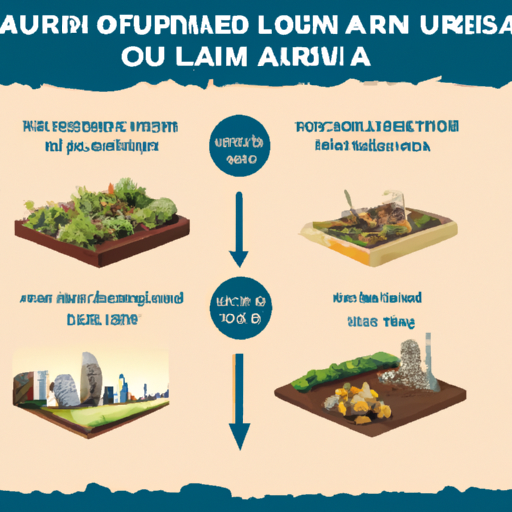
Urban farming has become a popular trend in Melbourne, offering a multitude of benefits for both individuals and the community. From enhancing food security to promoting sustainability and fostering a sense of community, urban farming has transformed the city’s landscape. With various initiatives sprouting up across Melbourne, more residents are embracing the joys of growing their own food and reconnecting with nature. In this article, we will delve into the numerous advantages of urban farming in Melbourne and how it is reshaping the urban environment. So, grab your gardening tools and get ready to explore the wonders of urban farming in Melbourne!
Benefits of Urban Farming in Melbourne
Urban farming in Melbourne offers numerous benefits to individuals, communities, and the environment. From improving food security to fostering community engagement, these initiatives have the potential to transform the urban landscape and promote a sustainable way of living. Let’s explore the various advantages of urban farming in Melbourne.
Improves Food Security
By practicing urban farming, Melbourne residents can decrease their reliance on imported food and increase their access to fresh and healthy produce. This reduces the vulnerability to supply chain disruptions and ensures a more stable food supply within the city. Whether it’s growing vegetables, fruits, or herbs, urban farming allows individuals to take matters into their own hands and contribute to their own food security.
Promotes Sustainable Living
Urban farming in Melbourne promotes sustainable living by reducing the reliance on chemical inputs, conserving water resources, and minimizing waste and landfill. With the ability to grow food in urban spaces, residents can produce their own organic and pesticide-free crops, promoting healthier eating habits and sustainable farming practices. Additionally, by utilizing urban areas efficiently, urban farming helps make the most of available space.
Fosters Community Engagement
One of the remarkable benefits of urban farming in Melbourne is the way it fosters community engagement. By bringing people together around a shared interest in growing food, urban farms become a hub of social connections and a source of a genuine sense of belonging. Residents, whether young or old, come together to collaborate and cooperate, sharing knowledge, skills, and resources. This sense of community strengthens social ties and builds resilience within neighborhoods.
Enhances Food Quality and Nutrition
Urban farming allows for the cultivation of organic, pesticide-free produce, resulting in higher food quality and improved nutrition. With the ability to grow a diverse range of crops, residents have access to a wider variety of fruits, vegetables, and herbs. This diversity promotes healthier eating habits and ensures a well-rounded diet. Furthermore, the freshness of the produce from urban farms ensures that the nutrients are preserved, contributing to the overall quality of the food.
Creates Green Spaces in the Urban Environment
The presence of urban farms enhances the aesthetic value of Melbourne’s urban areas, turning vacant lots and rooftops into vibrant green spaces. These green spaces not only improve the visual appeal of the cityscape but also contribute to better air quality and pollution mitigation. By absorbing carbon dioxide and releasing oxygen, urban farms act as natural air filters, making the surrounding environment healthier for residents. Moreover, these green spaces provide opportunities for outdoor recreation, allowing residents to connect with nature in the heart of the city.
Reduces Food Miles and Carbon Footprint
Urban farming plays a pivotal role in reducing food miles and carbon footprint. By growing food within the city limits, the transportation distances for food are minimized. This means that produce doesn’t need to be shipped from far-off places, reducing greenhouse gas emissions and lessening reliance on fossil fuels. The shorter food supply chain not only reduces carbon emissions but also promotes a more sustainable and efficient food system.
Boosts Local Economy
Urban farming has the potential to boost the local economy in Melbourne. By creating jobs and entrepreneurial opportunities, these initiatives provide a source of income for individuals and contribute to economic growth. Additionally, urban farms can support local businesses and markets by supplying them with fresh produce. The money spent on purchasing locally grown food stays within the community, stimulating economic activity and supporting local livelihoods.
Provides Therapeutic and Educational Opportunities
Beyond the tangible benefits, urban farming also offers therapeutic and educational opportunities. Engaging in gardening activities has been found to have therapeutic benefits, reducing stress and promoting mental well-being. Whether it’s tending to plants, harvesting crops, or simply being surrounded by nature, urban farming offers a respite from the fast-paced urban life. Furthermore, urban farms facilitate hands-on learning activities, allowing residents, schools, and community organizations to learn about sustainable food systems, gardening techniques, and environmental stewardship.
Mitigates Urban Heat Island Effect
Urban farming in Melbourne actively contributes to mitigating the urban heat island effect. The vast expanses of concrete and asphalt in cities create an environment that absorbs and retains heat, making urban areas considerably warmer than surrounding rural areas. By introducing green spaces through urban farming, the temperature in these areas is significantly reduced. The plants and vegetation act as natural coolants, absorbing heat and providing shade, creating a more comfortable and pleasant urban environment for residents.
Supports Biodiversity Conservation
Urban farming has a positive impact on biodiversity conservation by creating habitats for pollinators and beneficial insects. By planting a variety of flowers, herbs, and vegetables, urban farms attract bees, butterflies, and other pollinators, contributing to the conservation of these vital species. Additionally, urban farms provide opportunities to preserve and enhance local plant and animal species, helping maintain a diverse and resilient urban ecosystem.
In conclusion, urban farming in Melbourne brings a multitude of benefits. From improving food security and promoting sustainable living to fostering community engagement and supporting biodiversity conservation, these initiatives have the power to transform the urban environment. By recognizing the value of urban farming and supporting its expansion, Melbourne can take a significant step towards creating a more sustainable and inclusive city for all its residents.







